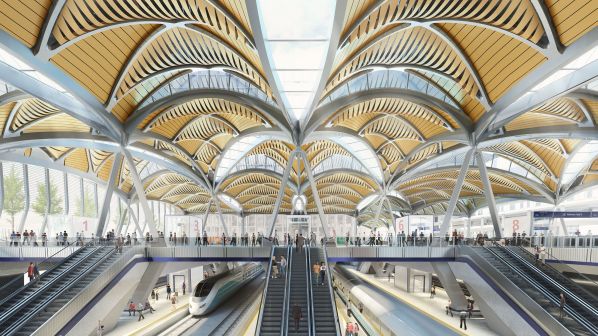In a letter to the HS2 review chairman, Mr Douglas Oakervee, which Berkeley tweeted on November 13, he says: “I cannot support its conclusions or recommendations and have serious problems with its lack of balance.” He says the lack of balance is reflected in the “often unquestioning acceptance of information provided by HS2 Limited and a failure to scrutinise the involvement of HM Treasury and the Department for Transport (DfT) in the development of the project.”
Although the report will not be published until after the British general election on December 12, the review is believed to be in favour of continuing with the HS2 project, which will see the construction of a high-speed line linking London, Birmingham, Manchester and Leeds, despite a huge increase in cost.
In September transport secretary, Mr Grant Shapps, confirmed that the expected cost of the project had risen to £81-88bn at 2019 prices against a budget equivalent of £62.4bn. Shapps also said that the completion of Phase 1 from London to Birmingham in 2026 is unrealistic with opening likely to be phased between 2028 and 2031, and Phase 2 following between 2035 and 2040.
Berkeley says that internal memos within HS2 in 2016 indicated serious concerns among senior managers that the £57bn funding envelope (at 2015 prices) was more likely to be between £84bn and £86bn even though the DfT was telling the Treasury that the budget was under control. Berkeley says there was even discussion at a 2016 conference attended by HS2, the DfT and the Treasury that the final cost could be as high as £100bn.
Two concerns
Berkeley has two concerns about the report. First, he says the report had to be completed in a very short time and that he was not invited to many of the meetings which Oakervee held with ministers and HS2. Berkeley believes there was a tendency to accept that the project would go-ahead, albeit with efforts to reduce costs and increase revenue, rather than considering other options such as terminating the line at Old Oak Common in west London rather than London Euston.
Secondly, Berkeley complains that the review failed to conduct a proper assessment of costs. He says HS2 spent £750m between 2009 and 2019 on professional fees but failed to deliver “a robust estimate of cost and a compliant business case” which he describes as “damning.”
Berkeley also questions whether HS2 Ltd, the Treasury and DfT are fit to take the project forward. He says HS2’s track record in controlling costs is very bad “starting at £32bn in 2011 to £103bn today. This is an increase of 122% even before any permanent construction work has started. Compare this with the criticism of Crossrail which is only 25% over budget.” He says many of the contracts involving work around Euston station “appear to be more like cost-plus ones, putting even more risk on the taxpayer.”
Benefit:cost ratio
Finally, Berkeley believes that the number of trains per hour assumed in the benefit:cost ratio (BCR) for HS2 are unrealistic. He says the draft review says it would be prudent to operate 14 trains/hour/direction, the maximum currently operated on high-speed lines around the world (apart from 15 trains/h/direction during peak periods on one Japanese Shinkansen line) whereas the draft review bases its BCR on 18 trains/h/direction to achieve a BCR of 1.1 to 1.8. He says a later option suggests 16 trains/h/direction which would cut costs by 6% and benefits by 24%. “Nowhere does the report provide a BCR on the basis of 14tph and a cost estimate of £103bn, probably resulting in a BCR of less than 1, meaning poor value for money,” Berkeley says, adding that this may not be the answer the review wants but is a likely outcome. “I suggest that to omit this is misleading and dishonest.” Berkeley says he does not support the review’s result and reserves the right to publish his own alternative report.

